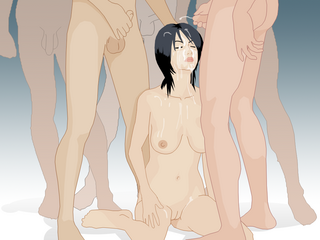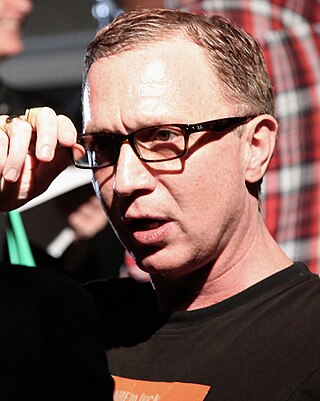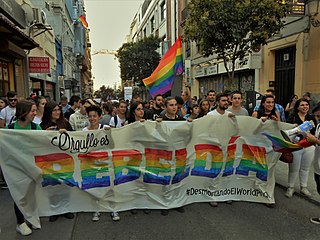DUMBA was a collective living space and anarchist, queer, all-ages community center and venue in Brooklyn, New York.
DUMBA (a feminized version of DUMBO —Down Under the Manhattan Bridge Overpass, the name of its NYC neighborhood) became a radical cultural nexus point around which the Queercore [1] movement flourished and an independent film scene developed. It was the site of many notable events, as well as being a residence for a few dozen people over the years. DUMBA was a unique experiment providing a combination of live music and disc jockeys (usually several DJs a night), film screenings of Super 8 and 16mm films, video, artwork, performances, vegetarian food, and an unrestricted erotic atmosphere.
DUMBA was founded in a loft, during the summer of 1996 by a group of people which included filmmaker Scott Berry, Kelly Besser, Vincent Baker, and others. [1] It would come to call itself the "DUMBA Collective" by around 2000.
The group's name, DUMBA, is derived from DUMBO, the neighborhood between Fulton Landing and Vinegar Hill.
The 5,000-square-foot (460 m2) loft used for the collective's space was commercially zoned under the Manhattan Bridge overpass [1] and housed six or seven residents between the years 1996 and 2006. It has been described as "a maze of rooms small and large". [2]
DUMBA lost its lease to the loft in 2006.
DUMBA first became known for putting on all-ages punk shows, which were promoted by word of mouth and simple photocopied flyers displaying a DIY aesthetic. Diana Morrow designed several of the flyers. Bands and performers who played DUMBA include The Need, Los Crudos, Limp Wrist, Nedra Johnson, The Spaceheads, Bitch and Animal, Octant, God Is My Co-Pilot, Tribe 8, Three Dollar Bill, Kaia, Patsy, The Lookers, and many more. In time, the venue began to feature more diverse performances by artists such as Vaginal Davis.
DUMBA was also involved in the Fuck the Mayor Collective, a queer activist organization created in response to what some believed were the racist, classist, sexist, and homophobic policies of the Giuliani administration. [3] In 1998, DUMBA and the Fuck the Mayor Collective created Gay Shame, a controversial anti-assimilationist and anti-consumerism response to the annual Gay Pride celebrations during June. Kiki and Herb and Three Dollar Bill performed, and Eileen Myles, Mattilda aka Matt Bernstein Sycamore, and Penny Arcade spoke at the event that year, which was filmed by Scott Berry and released as the documentary film Gay Shame 98. The event was written about by Alissa Chadburn in the San Francisco Bay Guardian :
The goal of Gay Shame in New York was to form a free "non-consumerist space for creating culture and community building" and to try to "build some opposition to the reactionary gay mainstream," which [Mattilda] says has "a stranglehold on all representations of queerness in the media. [3]
The collective behind Gay Shame also produced a fanzine each year for the occasion of the event, entitled Swallow Your Pride. Gay Shame was held at DUMBA in June 1998 and June 2000 (June 17, 2000).
The second iteration of Queeruption, an annual international Queercore festival, was largely housed at DUMBA October 7–11, 1999. Hundreds of activists came from across the United States and Europe for this free, radical, queer "encuentro" that was part skill-share, part social event, and part conference, and that featured over 60 workshops, along with films, performances, and parties. There was also a Columbus Day action in Central Park in which city vehicles were "ticketed" for parking on stolen land, and to protest the arrest of a gay man, allegedly for cruising in the park (he claimed to be urinating).
Brooklyn Babylon Cinema, a recurring analog film screening series, was born at DUMBA and continued for several years. It featured events such as the "Times Square Sinema" on May 7, 1999, which provided a kissing booth and encouraged fraternization; a tribute to the Deuce's seedy past; and "Caught Looking" (March 2000), a program about voyeurism curated by Aaron Scott, which included two video programs, as well as installations by Rob Roth and others. Brooklyn Babylon Cinema regularly showed films by emerging directors, providing a space in which new work could develop, as well as work by better-known directors such as Sadie Benning, Anonymous Boy, G.B. Jones, Miranda July, and Scott Treleaven.
From 2000 through 2002, DUMBA was home to the "Lusty Loft Parties," described by writer and sex columnist Tristan Taormino as "pure queer erotic utopia, with people of all genders fucking side by side." [4] These parties were deemed successful and were written about in Village Voice several times, notably by Guy Trebay and by Taormino, though several years after the fact. [5]
The Lusty Loft Parties were part of the basis for the film Shortbus .
Around 2000, the group living in the space called themselves the "DUMBA Collective," a name that stuck until the collective's demise in 2006.
In 2004, writer Arial Levy described in New York Magazine DUMBA's trannyboi scene:
Being a boi means different things to different people—it’s a fluid identity, and that’s the whole point. Some women who call themselves bois are playing off "boy" in the gay-male S/M sense of the term, as in Daddy/Boy: The boy or boi is the submissive and, in the case of lesbians, has sex with dominant butches (tops). Some of the people who identify as bois are female-to-male transsexuals in various stages of the transition process, ranging from having had top surgery and taking testosterone ("T") to simply adopting the pronoun he. Some, like Lissa, date other bois and think of themselves as “fags,” while others only date femmes.
The article also noted that at Dumba "[t]hey have sex parties and art shows, and above the bathroom door, instead of GIRLS or BOYS, it says TRANNIES." [6]
John Cameron Mitchell's film Shortbus (2006) was partially shot at DUMBA in 2005. The "Lusty Loft Parties" are credited as the events on which he loosely based his movie. In the film, a hyperbolized DUMBA was the site of Justin Bond's salon. People associated with DUMBA appear in the film as "sextras". [4]
In October 2006, Village Voice quoted John Cameron Mitchell discussing DUMBA:
Still, real life and faux life merged while making the movie—the sexed-up loft scenes were shot in DUMBO at the DUMBA artists' space, and guess what: "DUMBA—where we shot it—has been shut down," Mitchell says. "The neighbors complained about parties and sex parties. The lease is up this December." [7]

Bukkake is a sex act in which one participant is ejaculated on by multiple participants. It is often portrayed in pornographic films.
Queercore is a cultural/social movement that began in the mid-1980s as an offshoot of the punk subculture and a music genre that comes from punk rock. It is distinguished by its discontent with society in general, and specifically society's disapproval of the LGBT community. Queercore expresses itself in a DIY style through magazines, music, writing and film.

Alisha Klass is a former American pornographic actress.
Kiki and Herb are an American drag cabaret duo. Bond portrays Kiki DuRane, an aging, alcoholic, female lounge singer. Mellman portrays her gay, male piano accompanist, known only as "Herb."
A gang bang is a sexual activity in which one person is the central focus of the sexual activity of several people, usually more than three, sequentially or simultaneously. The term generally refers to a woman being the focus; one man with multiple women can be referred to as a "reverse gang bang". The term has become associated with the porn industry and usually describes a staged event whereby a woman has sex with several men in direct succession. Bukkake is a type of gang bang originating in Japan that focuses on the central person being ejaculated upon by male participants.

Bruce LaBruce is a Canadian artist, writer, filmmaker, photographer, and underground director based in Toronto.

Tristan Taormino is an American feminist author, columnist, sex educator, activist, editor, speaker, radio host, and pornographic film director. She is most recently known for her book Opening Up: A Guide to Creating and Sustaining Open Relationships, which is often recommended as a starter guide to polyamory and non-monogamy.
Scott Treleaven is a Canadian artist whose work employs a variety of media including collage, film, video, drawing, photography and installation.
Gay Shame is a movement from within the queer communities described as a radical alternative to gay mainstreaming. The movement directly posits an alternative view of gay pride events and activities which have become increasingly commercialized with corporate sponsors as well as the adoption of more sanitized, mainstream agendas to avoid offending supporters and sponsors. The Gay Shame movement has grown to embrace radical expression, counter-cultural ideologies, and avant-garde arts and artists.
Fanorama is a Rhode Island-based zine and zine-distro produced by journalist/activist REB. According to their website it is the "grand-daddy of the queer zine scene".

Shortbus is a 2006 American erotic comedy-drama film written and directed by John Cameron Mitchell. The plot revolves around a sexually diverse ensemble of colorful characters trying desperately to connect in an early 2000s New York City. The characters converge in a weekly Brooklyn artistic/sexual salon loosely inspired by various underground NYC gatherings that took place in the early 2000s. According to Mitchell, the film attempts to "employ sex in new cinematic ways because it's too interesting to leave to porn." Shortbus includes a variety of explicit scenes containing non-simulated sexual intercourse with visible penetration and male ejaculation.
Lucy Thane is a British documentary filmmaker, event producer and performer, living in Folkestone. Her films include It Changed My Life: Bikini Kill in the UK (1993) and She's Real (1997).

Pegging is an anal sex act in which a woman penetrates a man's anus with a strap-on dildo.
Bend Over Boyfriend (BOB) is a set of two sex education videos covering the practice of a woman penetrating a man's anus with a strap-on dildo. The first video, which was released in 1998, became the best-selling video to date for Good Vibrations, a sex-toy business. The video was also featured on The Daily Show. The videos promote the idea, as Eye Weekly puts it, that "fucking your boyfriend in the ass is fun".

Queer heterosexuality is heterosexual practice or identity that is also controversially called queer. "Queer heterosexuality" is argued to consist of heterosexual, cisgender, and allosexual persons who show nontraditional gender expressions, or who adopt gender roles that differ from the hegemonic masculinity and femininity of their particular culture.

Mattilda Bernstein Sycamore is an American author and activist. She is the author of two memoirs and three novels, and the editor of six nonfiction anthologies.

Paul Dawson is an American actor. In the 2006 comedy-drama film Shortbus, written and directed by John Cameron Mitchell, he played the secretly suicidal former prostitute James.

Queer anarchism, or anarcha-queer, is an anarchist school of thought that advocates anarchism and social revolution as a means of queer liberation and abolition of hierarchies such as homophobia, lesbophobia, transmisogyny, biphobia, transphobia, aphobia, heteronormativity, patriarchy, and the gender binary. People who campaigned for LGBT rights both outside and inside the anarchist and LGBT movements include John Henry Mackay, Lucía Sánchez Saornil, Adolf Brand and Daniel Guérin. Individualist anarchist Adolf Brand published Der Eigene from 1896 to 1932 in Berlin, the first sustained journal dedicated to gay issues.
Feminist pornography is a genre of film developed by or for those within the sex-positive feminist movement. It was created for the purpose of promoting gender equality by portraying more bodily movements and sexual fantasies of women and members of the LGBT community.

Critical pride is the name of several annual protest demonstrations of LGBT people held in Madrid and several other Spanish cities. The organizers of critical pride demonstrations present them as an alternative to the original pride parades and festivals, which they consider depoliticized and institutionalized.